9 Healthy Baby Breakfast Ideas for Hungry Munchkins
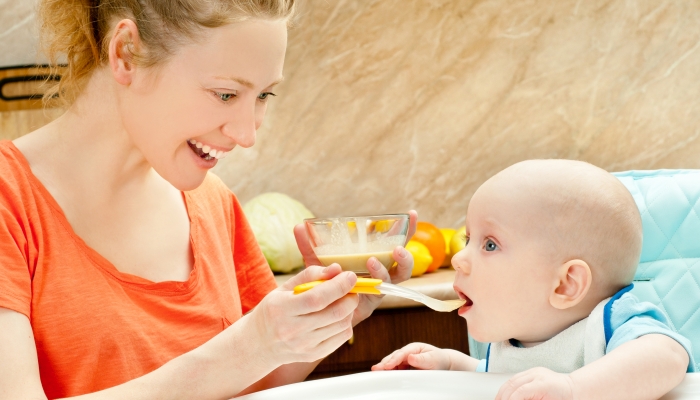
- Breakfast is a great time to try out new foods with your baby when they start solids.
- Breakfast is a time for your baby to have a sensory experience, learn about food, practice eating skills, and have social time with the family.
- Baby breakfasts don’t have to be bland to be healthy.
Breakfast is a great time to try out new foods with your baby. Breakfast foods are simple to make and easy for babies to eat. Many things that you eat for breakfast, like toast, avocado, overnight oats, or eggs, can be adapted for your baby too.
Breakfast for babies doesn’t have to be just the same flavorless baby cereal day after day. Throw some spinach into an omelet or banana puree into porridge. Not only will your baby get an extra boost of fruits or veggies, but they’ll also be trying out new flavors and textures.
The key to baby breakfast and weaning, in general, is to start small and simple and work your way up. By the end of your baby’s first year, they’ll have a ton of breakfast favorites.
Try out some of these healthy baby breakfast ideas for your hungry munchkin.
When Should You Start Giving Your Baby Breakfast?
Breakfast is a great time to try out your baby’s first solid foods. If you’re wondering when and how to start with solids, the Centers for Disease Control has set out guidelines for parents:
- Babies up to 12 months get most of their nutrition from breast milk or formula, with solid foods as a supplement.
- Babies can try solid foods between 4 and 6 months.
- Don’t try solids with babies under four months old.
- Start with single-ingredient foods which are mashed, pureed, or strained.
If your baby is showing interest in food, can sit up, and is trying to grasp small objects, they might be ready for solids, so get that stack of baby bibs ready!
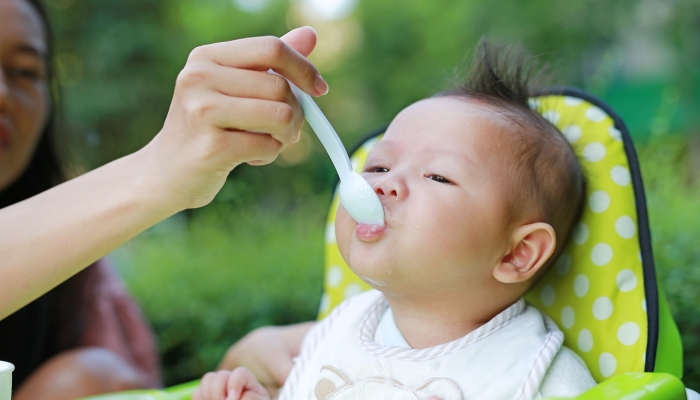
What Time Should Your Baby Have Breakfast?
There are a plethora of feeding schedules online and in parenting books that tell you what your baby should eat at what age. They also describe what your baby should eat for which meal and at what time of day.
If you find that schedules like these help you, by all means, follow them. However, for many parents, the time their baby has breakfast depends on the rhythms and routines of a busy family life.
Should your baby have milk before or after breakfast?
The time your baby has breakfast also depends on when you give them their first milk of the day, whether by bottle or breastfeeding. There are two schools of thought on when to give milk if you’re starting solids.
Some parents find that giving milk first and then waiting for a while to try some solids for breakfast works well. Once the baby is settled by milk, they’ll be open and interested in trying breakfast foods.
Others think you should offer solids before milk because a hungry baby will be more likely to try the solid food provided.
Either way, your child will still depend on formula and breast milk in their first year. Eating solids helps to familiarize babies with food, gives them a chance to work on oral skills, and teaches them social skills when they eat with their parents or siblings.
The trial and error of baby breakfast
Baby breakfast is also often about trial and error. You might find that your baby prefers milk first thing when they wake up, and about an hour later, they’re ready to try out breakfast.
Or, your baby might change their mind the next day and go for the baby cereal right away. That’s okay too.
The most important thing about feeding your baby solids, regardless of what time you do it, is not to force it. Eating is a sensory experience with a lot of information to process. Different babies react to different foods in different ways.
If your baby is fussing and turning away from what you offer, take their cues and try something else.
What Makes a Good Baby Breakfast?
A good baby breakfast contains no added sugar or salt, isn’t processed, and introduces your baby to healthy foods, including fruits, veggies, grains, fats, and proteins.
Many parents prefer to use a baby food maker for cooking homemade baby food in batches. However, it’s totally fine if you don’t have time on busy mornings to prepare homemade pureed food. Just make sure that the pouches and jars you’re buying don’t contain extra sugar or salt.
A good baby breakfast also doesn’t have to be complicated. Mashed banana or avocado is an easy, fast, and perfect baby breakfast in the early months of weaning.
As your baby gets older and more adventurous, you’ll introduce different foods in different formats. You’ll move from mashes and purees to finger foods. Or, if you’ve been doing baby-led weaning, you’ll be introducing new combinations of foods.
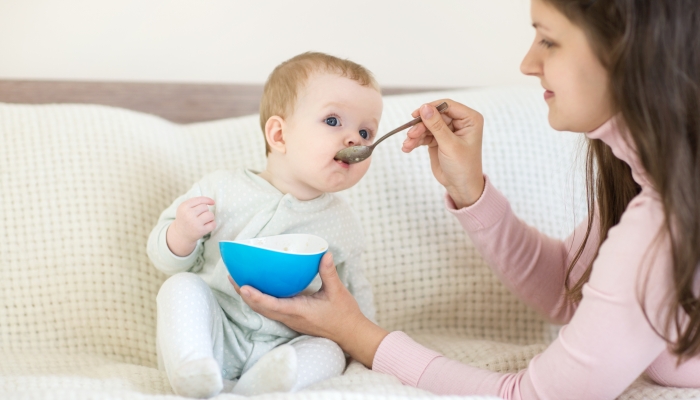
How Much Should a Baby Eat for Breakfast?
The amount your baby eats for breakfast depends on their age. Your baby will still be drinking a lot of formula or breast milk for the first year. As your baby grows, the number of times they eat solids and the amount they eat per day will increase.
The chart below is a first-year feeding guide based on similar popular charts to give you an idea of how much food babies eat. This is only a guide, and it will vary, of course, from baby to baby.
You may start with one tablespoon of cereal when your baby is five months old and then find that you’re swiftly moving up to five tablespoons.
| Baby’s Age | Breastmilk or Formula | Solid Food |
| 4-6 months | 4-8 sessions per day 24-32 ounces per day | 1-5 tbsps. Dry cereal 1-2 tbsps. Strained or pureed fruits and veggies (1-2 times per day) 1-2 tbsps. Meats or proteins (1-2 times per day) |
| 7-9 months | 3-6 sessions per day 32-36 ounces per day | 3 – 8 tbsps. Dry cereal 2 – 4 tbsps. Fruits and veggies (1-2 times per day) 1 -3 tbsps. Meats or proteins (1-2 times per day) |
| 9-12 months | 3-5 sessions per day 16-32 ounces per day | 5-8 tbsps. Dry cereal 2-4 tbsps. Fruits and veggies (2 times per day) 2-3 tbsps. Meats or proteins (2 times per day) |
What Drinks Should You Give Your Baby at Breakfast?
Breast milk or formula generally provides babies with all the fluids they need.
According to the American Academy of Pediatrics, babies under twelve months should not drink juice.
When you start solids, you can give a little water in a sippy cup. However, babies should have no more than one cup or eight ounces of water daily.
9 Healthy Baby Breakfast Ideas
Start simply with healthy baby breakfasts when you begin weaning. Before you know it, your little gourmet will be interested in many tastes and textures. Here are some baby breakfast ideas to grow with your little one.
Perfect first breakfasts (4-6 months)
These first healthy breakfast options work for little ones starting with solids, whether you’re doing traditional or baby-led weaning (BLW).
Easy avocados
Avocado is an amazing first food, full of healthy fats. It’s also easy to take anywhere. Mash a ripe avocado with a fork for a smooth spoon-feeding texture.
Avocado is an excellent BLW breakfast, too, chopped up into small cubes, as long as the avocado is soft and ripe.
Versatile bananas
Another perfect first food, bananas are packed with goodness and are loved by babies universally. They’re also incredibly versatile. Not to mention readily available and portable!
Mashed-up banana mixed with breast milk or formula is sure to be a winner for most babies. It works for baby-led weaning, chopped into slices or cubes.
You can mix banana pieces or puree with various baby cereals or oats.
Yummy steamed veggies
Yes, veggies for breakfast! Very soft steamed veggies, like broccoli, zucchini, cauliflower, or carrot, can all make an easy breakfast.
As your baby accepts more and more veggies into their diet, you can mix veggie purees or mix fruit and veggie purees together to create new tastes.
Mashed up, pureed, or served as BLW finger foods, veggies are a great way to start the day.
Wholesome baby cereals
Baby cereal is a staple food in the early months. Choose one fortified with iron and with no added salt or sugar.
The FDA and APA warn against relying on baby rice cereal as your only cereal because of its arsenic levels.
Oat, mixed grain, and barley cereals can be found in iron-fortified versions as an alternative to rice cereals. Mix them with formula or expressed breast milk.
Add pureed fresh fruit or yogurt to the mix as your baby grows. Or add veggies and protein to porridge as a savory base.
More adventurous mornings (6 to 12 months)
Now that you’re baby is getting the hang of the spoon or loving their finger foods, healthy baby breakfasts get more exciting.
A million ways with eggs
Scrambled eggs or hard-boiled and sliced are both easy and quick, providing protein, for you and your baby, on busy mornings.
Cut a cheese omelet into strips. Add spinach or peas to pack a healthier punch and serve with sliced tomato.
Tons of toast
There’s so much you can do with toast! Serve whole wheat bread toasted and buttered or with cream cheese and cut into strips. Add chopped strawberries or banana slices for a great breakfast.
Mashed avocado toast cut into strips is just as Instagram-worthy for babies as it is for adults. Just skip the added salt.
Serve toast with dips for your baby, like cottage cheese or unsweetened applesauce. The list is endless for this perfect first finger food.
Pretty pancakes
Pancakes are a versatile and easy favorite for the whole family. Just don’t add sugar if your baby is joining in.
For flavor and added fun, serve pancakes with chopped-up fresh fruit, yogurt, or unsweetened applesauce.
Are you concerned about getting enough veggies into a reluctant eater? In that case, savory pancakes with spinach, shredded zucchini, or sweet potato mixed into the batter are worth a try. Plus, they give the pancakes amazing colors, which many kids enjoy.
Fun French toast
Healthy French toast cut up into fingers provides your little one with nutrients and some new textures and flavors. Add a pinch of cinnamon, for example, or try using raisin bread.
Serve French toast with yogurt and berries or mashed-up mango.
Awesome overnight oats
Overnight oats are a great baby breakfast because you can make them ahead for yourself and your baby. Store prepared oats for up to four days in the fridge or freeze them into cubes.
Mix overnight oats with chia seeds to give them the right consistency for your baby. Add mashed banana or blueberry to the overnight mix to give flavor to this super healthy morning meal.
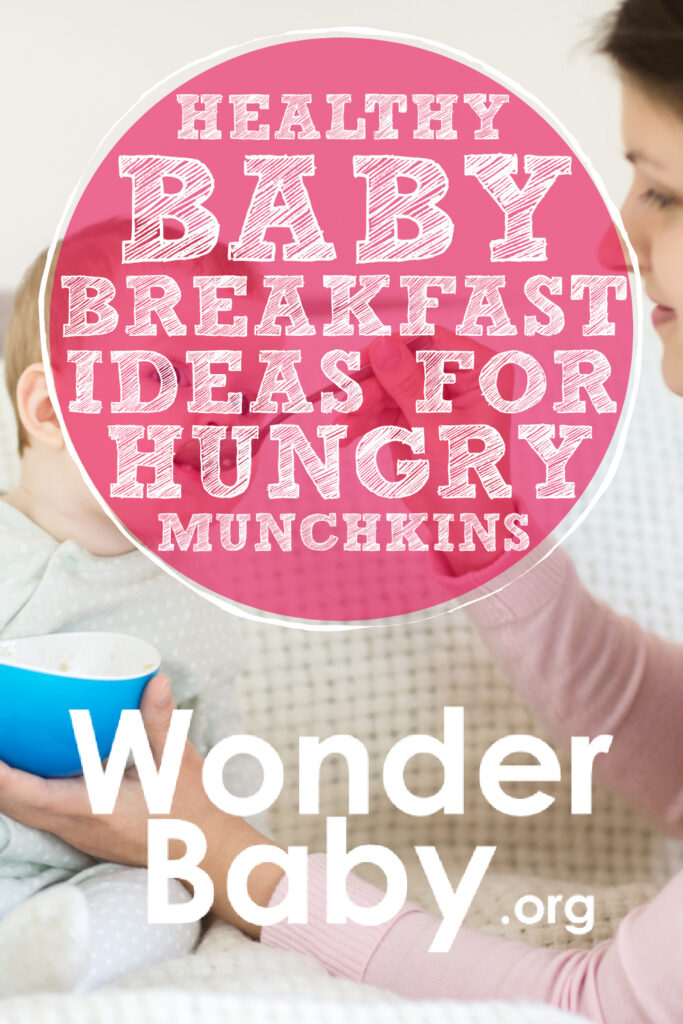
Related Posts
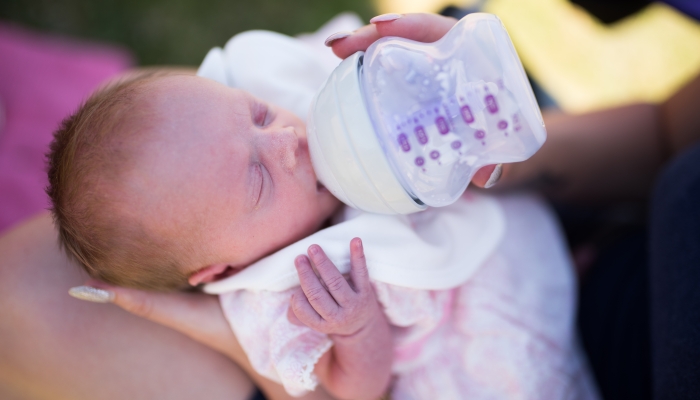
Feeding and Eating, Special Needs
Feeding Therapy Approaches for Infants with Special Needs
Many children with special needs have feeding difficulties. Working with a speech therapist, being patient, and experimenting with textures can help.

Feeding and Eating
Unexpected Foods That Cause Allergen Cross-Reactivity
A variety of unexpected foods and environmental substances can trigger an allergic reaction through cross-reactivity to food proteins.

Feeding and Eating
Easing Anxiety for Families Facing Food Allergies
Ongoing physical preparations and speaking openly about anxiety can ease the transition from diagnosis to living well with a food allergy.